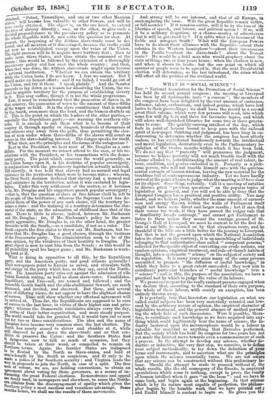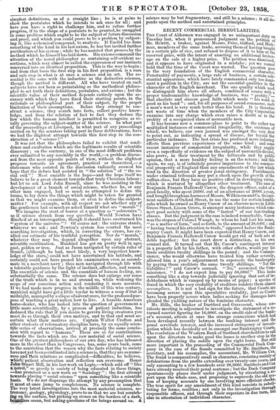WHAT IS " SOCIAL SCIENCE" ?
TH_E " National Association for the Promotion of Social Selene()" has held its second annual congress ; the meeting at Liverpool has been by all fashionable tests " a success" ; the members of the congress have been delighted by the vast amount of eminence, influence, talent, enthusiasm, and indeed genius, which have lent lustre to their proceedings ; we shall have the record in a second great thick volume, which very few persons will read, into which some few will dip here and there for favourite topics, and which will adorn well-furnished libraries for some two or three genera- tions to come. The quickly-moving intellect of the day, which feels in point of honour bound to keep pace with the railroad spirit of newspaper thinking and judgment, has been busy in en- deavouring to determine whether the congress has been utterly useless, or has contributed handsomely towards the intellectual and moral legislation, derivatively even to the Parliamentary le- gislation of the twelve months within which it has been held. We do not say that " posterity" will pronounce the judgment, because we believe posterity will not much trouble itself with the volume alluded to, notwithstanding the amount of real talent, la- bour, erudition, and genius embodied in it. Posterity is a pick- some person, who will not trouble himself save with the quintes- sential extracts of human wisdom, leaving the raw material for the troublous toil of contemporaneous industry. Yet wo have hardly arrived at the point whence to judge what the meeting will have done for its object. Something, certainly. Call it a meeting of notables to discuss great "previous questions" on the popular topics of legislation in general, and you will not be able to deny that the Liverpool Congress has a practical and positive utility. You may doubt, and we believe justly, whether the same amount of earnest- ness and energy thrown within the walls of Parliament itself might not have more direct and larger results ; but if men find their voices too weak, if they have proved the vulgar rule that " familiarity breeds contempt," and cannot get Parliament to listen to them unless they mount the vantage ground of St. George's Hall at Liverpool, we must be content to let the first de- bate of our bills be carried on by that circuitous route, and be thankful if the bills are a little better for thejourney to Liverpool. But that is not the ground upon which the National Association takes its stand ; on the contrary, it is an assembling of individuals belonging to that authoritative class called " competent persons," collected for the specific object of converting our crude notions, our random opinions, empirical treatment, and rule-of-thumb habits of thought, into a systematic " science" on the subject of society and its regulation. It is many years sinoe many of the same persona assembled to promote " the diffusion of useful knowledge," in which they have to a great extent succeeded ; they now aim to coordinate particular branches of " useful knowledge" into a " science" ; and in this, the purpose of the association, we have a practical test by which to judge the value of its labours.
We prove our respect for the really eminent persons engaged when we declare that, according to the standard of their own purpose, the whole of their labour, with scarely an exception, has been entirely thrown away.
It is perfectly true that heretofore our legislation on what are called social subjects has been very materially retarded and low- ered by the arbitrary nature of opinion, the empirical character of legislative treatment, and the general absence of method pervad- ing the whole field of such discussions. Were it possible, there- fore, to coordinate such knowledge as we have acquired into any- thing which could legitimately bear the name of science, the in- dustry bestowed upon the metamorphosis would be a labour as valuable for mankind as anything that Hercules performed. But the society which has held its congress for two years has not yet made the faintest move towards even a commencement of such a process. In the attempt to develop any science, whether de- ductive or inductive, the very first step, we conceive, is to define your subject methodically, to lay down the definition of your terms and instruments, and to ascertain what are the principles upon which the science essentially turns. We are not aware that any science can be constructed without this preliminary la- bour. Should the attempt be made to proceed without it the whole results, like the old cosmogony of the Greeks, iu empirical speculations which come to nothing, except to prove the mill Of human intellect when it goes " on the loose " : and we have to come back, and begin again at the beginning. In that science which is by its nature most capable of perfection, the plukeo- pher begins by the humble work that we have pointed out. and Euclid himself is content to begin so. He gives you the
simplest definitions, as of a straight line • he is at pains to show the postulates which he intends to ask once for all ; and here you have a right to challenge him, and to refuse further progress, if in the shape of a postulate to be granted, he smuggled in some problem which ought to be the subject of future discussion and proof, and which you could prove to be a problem by subject- ing it, like a chemical compound, to analysis. If Euclid has done something of the kind in his last axiom, he has but invited further purification of his system ; while he has assisted that process by the method which he himself has laid down. His axioms command the attention of the moral philosopher as containing self-evident as- sertions, which may almost be called the expression of our instincts converted into an identical proposition. This is the way to begin; and from that basis the first step in his first proposition is a sure and safe step in what is at once a science and an art. The es- sential is the same with the inductive as the deductive sciences, though the method is different. All who have treated on such subjects have not been so painstaking as the methodical philoso- pher to set forth their definitions, postulates, and axioms ; but the scientific value of their method depends entirely upon the ac- curacy with which they have fixed their starting points, in the rationale or philosophical part of their subject, by the prop& limitation of their assumptions. Before they attempt to con- struct a science, they search into facts, collect positive know- ledge, and from the relation of fact to fact they deduce the law which the human intellect is permitted to recognize as vi- tally governing the subject-matter of the science. In what part of the proceedings at Liverpool, in what part of any proceedings carried on by the senators taking part in those deliberations, have we had the slightest attempt towards this first step in the con- struction of a • science ?"
It was not that the philosophers failed to exhibit that confi- dence and exultation which are the legitimate results of scientific discovery ; on the contrary, in one of the most difficult problems ever submitted to any assembly in the world,—a problem discus- sed from the most opposite points of view, without the slightest progress towards an agreement, practical or theoretical,— a statesman who assisted in the discussion radiantly avowed his hope that the debate had assisted in " the solution " of " the so- cial evil " ! Most amiable is the hope—and the hope itself we believe to be a great element towards that truly Christian labour; but let us ask Lord John Russell, since he was assisting in the development of a branch of social science, whether he, or any other man engaged, had so much as attempted to define the terms, to lay down the things which might be taken for granted so that we might examine them, or even to define the subject- matter ? For example, with all respect we ask whether any Of the gentlemen had so much as asked himself what are " morals " ?
We imagine the start of horror at a question so " subversive"; as if science shrank from any question. Would Newton have flinched at an interrogation, though it should have overturned his "system of the universe " ? Of course not : the universe stands, whatever we ask ; and Newton's system has courted the most searching investigation, which, in correcting the errors, has ex- alted our estimate of his truthful perception. Nor do " morals " whatever they may be, depend altogether upon any abstract, scientific coordination. Mankind has got on pretty well in ages past, golden or iron. Just as Jason navigated by certain rules of thumb, (although he had, most likely, a very imperfect know- ledge of the stars,) could not have ascertained his latitude, and certainly could not have passed his examination even as second- mate in a merchant navy. • thus men navigated through life with a tolerable guidance by the light of instinct, affection, and reason. The essentials of science and the essentials of human feeling, are substantially the same. The science does but enlarge our sense of the truth which is in us and around us, while widening the scope of our conscious action and rendering it more accurate. If we had made more progress in the middle of this wise century, mankind might have got a little too far to witness a coup d'etat at midnight, managed by a clique of adventurers, for the professed pur- pose of teaching a great nation how to live. A humble American horse-dealer, who has looked into the question of government a little more scientifically, by a process of patient induction, has deduced the rule that if you desire to govern living creatures you must do so through their own motives, and to that end must as- certain what their motives are. Captain Walter Crofton and other students of reformatory discipline have, by an equally scien- tific series of observations, arrived at precisely the same conclu- sion with regard to "humans." These are so far contributions towards the facts which are the raw material of social science. One of the greatest philosophers of our own day, who has laboured more in the closet than in Congresses, has, some years back, come to the conviction that the reason why the facts relating to society havenot yet been coordinated into a science is, that they axe so nume- rous and their relations so complicated—difficulties, he believes, Whic-V patient observation and reflection can overcome. Hence John-Stuart Mill, in his last work on Logic —which sold off "like a novel," so greedy is society of being educated in these things, —haspromised us a new work on " Sociology " • the first attempt towards placing " social science " upon something like a scientific basis. We do not disparage the attempt by any presumption that it must at once jump to completeness. No science is complete. The very latest investigations into the most material sciences, as- tronomy, geology, physiology, prove to us that we are but scratch- ing on the surface, but picking up stones on the borders of a dark, Imundless ocean, but asking questions of the beings around us. A.
science may be but fragmentary, and still be a science ; it all de- pends upon the method and ascertained principles.



























 Previous page
Previous page